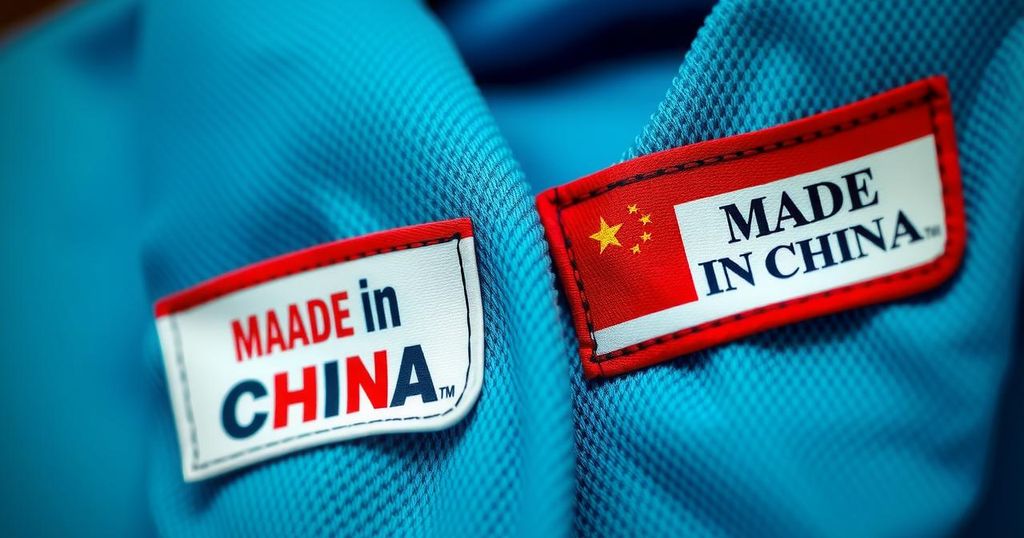The Impact of Chinese-Made Election Merchandise on U.S. Manufacturing

As the U.S. presidential election nears, cheap Chinese-made election merchandise overwhelms the market, undermining American manufacturers. Items like caps and T-shirts are available at significantly lower prices from platforms like Temu compared to official campaign stores, raising concerns about economic integrity amid political advocacy for domestic manufacturing.
As the United States presidential election progresses, a significant rise in election merchandise among voters is noteworthy. However, many may be unaware that items such as the ‘Make America Great Again’ hats and ‘Childless Cat Lady for Harris’ T-shirts are often produced in China. E-commerce platforms have enabled a surge of affordable election merchandise from Chinese suppliers, leading to increased competition for American manufacturers. Ben Waxman, co-founder of American Roots, emphasizes the detrimental impact on U.S. businesses due to the influx of cheaper goods, stating, “I think the amount of stuff on Amazon and Etsy that’s coming from China and other countries… is drastically impacting American manufacturers’ … ability to compete and grow our own business.” While U.S.-made T-shirts retail for around $15, similar items from China are listed for as low as $3 on platforms like Temu. The sheer volume of Chinese-made election items on platforms like Amazon disparately affects the marketplace. For instance, the price for a ‘Make America Great Again’ hat on Temu is under $4, while the official Trump campaign sells the same item for $40. Similarly, ‘Kamala Harris 2024’ merchandise demonstrates the disparity, costing less than $3 on Temu compared to $47 on the official campaign store. This pricing contrast highlights the challenges the U.S. faces in curtailing reliance on Chinese imports linked to legislative loopholes that permit tax-free shipment of goods valued under $800. Kim Glas, President of the National Council of Textile Organizations, notes that this loophole has led to substantial disruptions in American manufacturing. Furthermore, sales of campaign products have reportedly slowed down compared to previous election cycles. When approached, Amazon and eBay did not comment on their policies regarding these imports. Temu claims their success stems from operational efficiencies rather than reliance on lax import duties, welcoming any legislative changes that would benefit consumers. The irony remains palpable as American presidential candidates advocate for manufacturing reforms while their supporters buy low-cost Chinese products. Mitch Cahn from Unionwear remarks that the lack of ownership over campaign merchandise complicates the economic message: “If someone is supporting a candidate … by buying a product that’s made in a country that stands for the opposite … they’re doing themselves … a disservice.” The rampant production of election materials in China, including Trump-related merchandise, ignites a debate about authenticity and economic integrity within these campaigns. Chris Tang of UCLA highlights that while there is evidence of manufacturing job losses, the availability of low-priced imports also fosters opportunities for small businesses to quickly access products. In conclusion, the influx of inexpensive election merchandise manufactured in China underscores a broader issue of economic integrity for U.S. candidates and their supporters. The disparity in pricing and the subsequent effects on American manufacturers reveal underlying conflicts within the political discourse on trade and domestic production. The challenge remains to balance consumer interests with the pursuit of a robust domestic manufacturing sector focused on high-value goods.
The relationship between the United States and China has heavily influenced the manufacturing of election merchandise, with many products being produced overseas. Several e-commerce platforms afford Chinese manufacturers the ability to sell goods at significantly lower prices than their American counterparts. This situation raises questions about the implications for American businesses and the economic integrity of those supporting political candidates. Understanding this context is essential, particularly as various stakeholders navigate the complexities of domestic manufacturing and international trade policies.
The article reveals the complex dynamics at play in the U.S. election merchandise market, particularly the challenges faced by American manufacturers in light of cheaper Chinese imports. It highlights the irony of voters purchasing foreign-made election gear while supporting candidates who advocate for American manufacturing. Furthermore, the implications of legislative loopholes and the broader economic consequences signal a need for a reevaluation of trade policies and domestic production strategies.
Original Source: www.voanews.com







